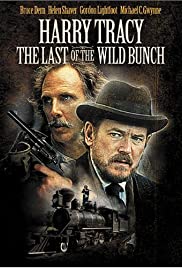
HARRY TRACY
Canada, 1982, 107 minutes, Colour.
Bruce Dern, Helen Shaver.
Directed by William A Graham.
Harry Tracy is a Canadian-made western, directed by William Graham who made many film and television features. Bruce Dern is effective as the star, a would-be outlaw who values his reputation, operates in the Rockies states, eventually meets his doom.
The film is reminiscent of those turn of the century westerns which showed the transition from the frontier to the 20th century cities and the opening up of the country by the railways. Films like £he Wild Bunch, The Battle of Cable Hogue, Butch Cassidy and the Sundance Kid treated these themes. The film is a nostalgic western, but it also has images of the outlaw as hero, the perspective quite common for the outlaws of the West. They were glamorised in people's memories, the stories and by the media.
In the supporting cast is Helen Shaver as the respectable woman who is attracted by Tracy. The Rockies' locations are attractive, Dern is a credible character, the supporting cast offer interesting vignettes. Included in the cast is Gordon Lightfoot who also sings a final song.
1. Interesting and enjoyable western? A nostalgic western? The end of an era? A western of the 1980s and the lack of interest in audiences for the westerns in the 1980s?
2. Location photography, the Rockies, the mountains? The towns of the turn of the century? The atmosphere of the period? The changing West and the changing frontiers?
3. The musical score, atmospheric?
4. Harry Tracy as outlaw: Bruce Dern's presence and style, in action, the portrait of the outlaw, his background as a youngster, the robberies, the violence, the encounter with Katherine and her helping to have him caught, the press reports, his attraction towards Katherine, the attitude of the authorities, their cruelty in exposing him to the cold, Katherine's intervention, his escape? countryside, the encounter with David, talking, his being painted, going together, the robberies, the reports? in the city, the banks, his plans, his concern about his reputation, going to the authorities, betrayed, in prison, the condemnation in court, the experience in the jail, his taunting authorities, the escape, the collaboration with David, meeting Katherine again, their claims, her going with him, being welcomed into ordinary households, the boy with the comic book and Tracy telling about his reputation, the confrontation with David, the authorities pursuing, the posse, David's betrayal and drawing his gun, his death? The lyrical sequences with Katherine? The techniques for eluding pursuers? food? The man with the barn, giving him the money? Did he betray Tracy and Katherine? The building, the posse coming, Tracy in the field, taunting the pursuers, his death? the burial and the photos? The death of the outlaw?
5. The meaning of outlaws in their times? Justice? Violence? Seeing themselves as heroes? The passing of the age of outlaws?
6. Katherine, her place in society, the encounter with Harry Tracy, attracted the his visiting her, her decision to go with him? Changing the clothes, eluding the posse, the sexual relationship? Her presence at his funeral? His saving her life?
7. David, in the Rockies, his art, his attraction towards the outlaw, painting him, wanting to share, his brutal side, the violence in the city, jail, his betrayal of Harry, his death? The authorities, vengeful attitudes, cruelty, the posses, the confrontations and fights, the finale and the shoot-out?
8. A portrait of the changing West?